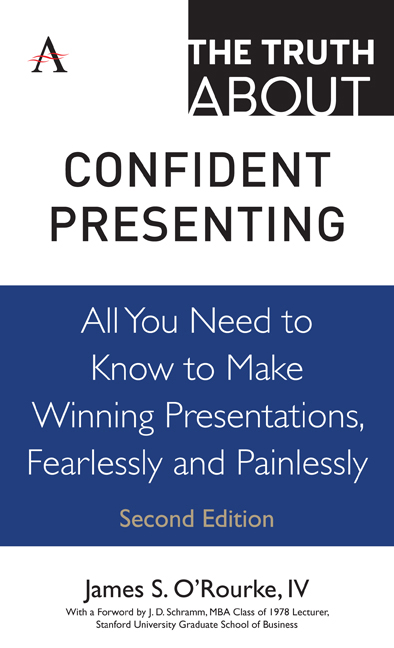 The Truth about Confident Presenting
The Truth about Confident Presenting Book contents
- Frontmatter
- Contents
- Foreword
- Introduction
- Part I Some Initial Truths
- Truth 1 Public speaking is not easy, but it's certainly doable
- Truth 2 The key to success is preparation
- Truth 3 Rehearsal is essential
- Truth 4 Emulating good speakers makes you better
- Truth 5 Establish goals for your presentation
- Truth 6 A presentation is a learning occasion
- Part II The Truth About Getting Ready to Speak
- Part III The Truth About What Makes People Listen
- Part IV The Truth About Developing Support for Your Presentation
- Part V The Truth About Getting Up to Speak
- Part VI The Truth About Managing Anxiety
- Part VII The Truth About Nonverbal Communication
- Part VIII The Truth About Visual Aids
- Part IX The Truth About Handling an Audience
- Part X The Truth About What Makes a Presentation Work
- References
- Acknowledgments
- About the Author
Truth 6 - A presentation is a learning occasion
from Part I - Some Initial Truths
- Frontmatter
- Contents
- Foreword
- Introduction
- Part I Some Initial Truths
- Truth 1 Public speaking is not easy, but it's certainly doable
- Truth 2 The key to success is preparation
- Truth 3 Rehearsal is essential
- Truth 4 Emulating good speakers makes you better
- Truth 5 Establish goals for your presentation
- Truth 6 A presentation is a learning occasion
- Part II The Truth About Getting Ready to Speak
- Part III The Truth About What Makes People Listen
- Part IV The Truth About Developing Support for Your Presentation
- Part V The Truth About Getting Up to Speak
- Part VI The Truth About Managing Anxiety
- Part VII The Truth About Nonverbal Communication
- Part VIII The Truth About Visual Aids
- Part IX The Truth About Handling an Audience
- Part X The Truth About What Makes a Presentation Work
- References
- Acknowledgments
- About the Author
Summary
Each presentation is a learning opportunity for your audience. They may be revisiting familiar concepts and ideas, or they may be exploring uncharted territory. But for everyone seated in front of you, your presentation is an opportunity to learn something new or reinforce previous learning.
In the middle of the last century, a college professor by the name of Benjamin Bloom, led a group of his colleagues in examining how people learn. One of their most useful observations was a classification system used to examine various types of learning. In their study of university students across the United States, they found that learning falls broadly into three categories:
■ Knowledge: Mental skills that involve the direct transfer of information about a subject from speaker to listener.
■ Attitude: Growth in feelings or emotional areas. This would result in greater appreciation or valuing of the subject.
■ Skills: Manual or physical skills. The skills may be as complex as learning to sail or as simple as learning to ride a bicycle.
You need to think about the objectives of your presentation in terms of what you want your audience to learn. Learning to appreciate abstract expressionism or fine wines is a much different experience from learning how to swim or how to do your annual tax return. Let's focus on the first two of those categories and begin with the knowledge domain. Bloom and his colleagues defined a hierarchy of understanding that moves from basic, elementary stages of learning to highly advanced levels. As you establish your objectives for a presentation, think about which of the following levels of learning might be most appropriate for your audience:
■ Knowledge: This level includes the most basic forms of observation and recall of information. This might include knowledge of dates, events, places and major ideas.
■ Comprehension: This level involves more than basic recall; it entails an understanding of what the facts mean, along with an ability to translate knowledge into a new context. Your audience should be able to interpret facts, compare, contrast, infer causes and predict consequences.
Information
- Type
- Chapter
- Information
- The Truth about Confident PresentingAll You Need To Know To Make Winning Presentations, Fearlessly And Painlessly, pp. 21 - 24Publisher: Anthem PressPrint publication year: 2019